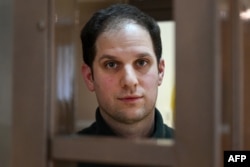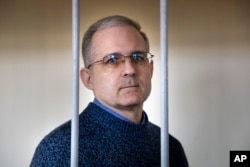The arrests of two Americans in Russia this month came against a stark backdrop: At least six U.S. citizens and one permanent resident were already behind bars in jails and prisons across the country, some serving long sentences and others facing trials that few believe will be fair.
In many cases, they are seen by relatives, colleagues, and the U.S. government as hostages – innocent people who, whether their initial arrests were engineered for the purpose or not, are being held as bargaining chips amid President Vladimir Putin’s escalating confrontation with Washington and the West.
Most recently, an American soldier identified by Russian authorities as Staff Sergeant Gordon Black was detained in the Far Eastern city of Vladivostok and subsequently jailed in pretrial detention on a theft charge until July 2, a term that can be extended. He faces up to five years in prison if tried and convicted on that charge.
The U.S. Army said that a soldier was detained in Vladivostok, but U.S. authorities have not released the soldier’s name.
In the United States, the soldier’s arrest sparked concerns that Russia could be adding to the growing number of Americans it is holding for potential use in prisoner exchanges or for other geopolitical purposes.
Meanwhile, on May 7, a Moscow court said it had ordered an American man it identified as William Russell Nycum jailed for 10 days for petty hooliganism after he was seen apparently drunk and naked or partially naked and showing “a clear disrespect for society, citizens, and public order.” Petty hooliganism is an administrative offense, but the pro-government newspaper Izvestia reported, without citing sources, that he could additionally be charged with vandalism, a crime that is punishable by up to three years in prison.
Mark Galeotti, an author and analyst of Russian politics and security matters, said that the detentions in Vladivostok and Moscow “do not simply seem to be arbitrary arrests.”
“That said, though, given that hostage-taking does seem to have become part of Russian statecraft, especially as relates to Americans, who knows how these cases could, if the Kremlin chooses, be escalated,” Galeotti told RFE/RL in an e-mailed comment.
Russia had faced accusations of using foreign citizens as hostages for several years before Putin launched the full-scale invasion of Ukraine and stepped up his bellicose rhetoric, casting the war it started against its neighbor as part of a civilizational struggle against the West.
U.S. basketball star Brittney Griner returned home in December 2022 in exchange for notorious Russian arms dealer Viktor Bout, and former U.S. Marine Trevor Reed was swapped for convicted drug trafficker Konstantin Yaroshchenko in April of that year.
But no American arrested after the start of the full-scale invasion on February 24, 2022, has been released in a prisoner exchange. Since that date, moreover, Russia has increased tension by jailing two U.S. journalists: Evan Gershkovich of The Wall Street Journal and Alsu Kurmasheva of Radio Free Europe/Radio Liberty (RFE/RL).
And a potential swap that could have freed Kremlin opponent Aleksei Navalny and two U.S. citizens whose names were not specified never took place; Navalny died under unexplained circumstances in an Arctic prison on February 16.
Asked how many U.S. citizens are currently being held in Russia and whether it is a record number, the U.S. Embassy in Moscow told RFE/RL: “Due to the inconsistency with which the Russian authorities notify U.S. Embassy officials regarding detained American citizens, it is not possible to provide an accurate count of U.S. citizens currently held in Russian custody.”
The State Department “continuously reviews the circumstances surrounding the detentions of U.S. nationals overseas, including those in Russia, for indicators that they are wrongful,” Daniel Kanigan, deputy spokesman for the embassy, said in an e-mail. “When making assessments, the department conducts a legal, fact-based review that looks at the totality of the circumstances for each case individually.”
The U.S.-based Foley Foundation, whose mission includes efforts to secure freedom for Americans held unjustly captive abroad, considers Gershkovich, Kurmasheva, and Paul Whelan, an American serving a 16-year sentence on espionage charges he denies, to be “hostages” and “wrongful detainees.”
The U.S. government has designated Gershkovich and Whelan, but not Kurmasheva, as “wrongfully detained.”
Here is a list of U.S. citizens — and one permanent resident — currently being held in prison or pretrial detention in Russia:
Evan Gershkovich
Evan Gershkovich, 32, a correspondent for The Wall Street Journal, was arrested in March 2023 while on a reporting trip in the Russian city of Yekaterinburg and charged with espionage – the first American journalist to face such a charge since the Soviet era.
Russian authorities have not provided any evidence to support the charge, which The Wall Street Journal and the U.S. government have vehemently rejected. They say Gershkovich was merely doing his job as an accredited reporter when he was arrested.
U.S. Ambassador to Russia Lynne Tracy said in March after Gershkovich’s detention was extended that his case “is about using American citizens as pawns to achieve political ends.” The U.S. State Department said in December that Moscow rejected a significant offer it made to secure the release of Gershkovich and Whelan.
Alsu Kurmasheva
Alsu Kurmasheva, 47, a Prague-based journalist with RFE/RL who holds U.S. and Russian citizenship, has been held in pretrial jail in Kazan, capital of Tatarstan, since October 2023 on a charge of failing to ask the Russian government to register her as a “foreign agent.”
She had initially been detained in early June when she was preparing to leave Russia after a visit to care for her elderly mother. Her passports were confiscated at the time. In December, she was additionally charged with spreading falsehoods about the Russian military, a crime punishable by 10 years in prison.
The “foreign agent” charge carries a maximum prison term of five years, while the second charge is punishable by up to 10 years. Kurmasheva and RFE/RL deny the allegations. RFE/RL and the U.S. government say the charges are a reprisal for Kurmasheva’s work as a journalist.
Paul Whelan
Paul Whelan, 52, a Michigan-based corporate security executive, was arrested in December 2018 on espionage charges while visiting Moscow for a friend’s wedding. Russia claimed Whelan was caught with a computer flash drive containing classified information.
Whelan, who holds U.S., British, Canadian, and Irish citizenship, said he was set up in a sting operation and had thought the drive, given to him by a Russian acquaintance, contained vacation photos.
In June 2020, he was found guilty and sentenced to 16 years in prison. He is currently in a high-security facility. The U.S. government said Russia produced no evidence to prove Whelan’s guilt during a trial that it called a mockery of justice.
Marc Fogel
Marc Fogel, 62, an English teacher, was arrested at an airport in Moscow in 2021 for carrying about half an ounce of medical marijuana. He was sentenced to 14 years in prison after prosecutors claimed he intended to sell the drugs to his students.
Fogel had been teaching for nearly a decade at the Anglo-American School of Moscow, a now-shuttered K-12 school that had been established by the U.S., Canadian, and British embassies.
Fogel, who had surgeries on his back, shoulder, and knee, said he began to use medical marijuana while in the United States on summer break to cope with pain and tried to bring some of it back to Russia, where it is illegal.
Ksenia Karelina
Ksenia Karelina, 32, is a dual U.S.-Russian citizen who worked at a spa in Beverly Hills, California. She was arrested in February on treason charges in the Urals city of Yekaterinburg, where she traveled to visit family.
The Russian Federal Security Service accused Karelina of “providing financial assistance to a foreign state in activities directed against the security of our country.” It claimed without evidence she had been collecting money for “tactical medical supplies, equipment, weapons, and ammunition.”
The rights group Pervy Otdel said she allegedly transferred $51.80 from her U.S.-based bank account to the Razom For Ukraine foundation, which helps Ukrainian civilians. Karelina is also known by her married name, Khavana.
David Barnes
David Barnes, 66, a Texas resident, was arrested by Russian authorities in Moscow in January 2022 on charges of abusing his children in the United States. In February of this year, he was convicted and sentenced to 21 years in prison.
Barnes had traveled to Moscow in December 2021 to win the right to either see his children or bring them back home. His ex-wife, Svetlana Koptyaeva, fled to Russia with the children in 2019 amid divorce and custody proceedings. A Texas court in 2020 awarded Barnes custody of the children, and Koptyaeva is now wanted by the United States on charges of interfering with child custody.
Koptyaeva had accused Barnes of child abuse, but a 2018 investigation by the Department of Family and Protective Services did not find sufficient evidence to support such a conclusion and closed the case without filing any charges.
Vladimir Kara-Murza
Vladimir Kara-Murza, 42, is a dual Russian-British citizen and a U.S. permanent resident who was born in Moscow. He is a staunch Kremlin opponent and was a key advocate for the U.S. Magnitsky Act, which sets out sanctions for human rights violators in Russia.
Kara-Murza, who twice nearly died after what says were deliberate poison attacks in Russia, was arrested in April 2022 after vocally criticizing Russia’s war against Ukraine. A year later, he was convicted and sentenced to 25 years in prison on treason and other charges.
The charges stemmed in part from comments in which Kara-Murza accused the “dictatorial regime in the Kremlin” of committing war crimes in Ukraine. The sentence is the longest prison term imposed on a Kremlin opponent in post-Soviet Russia.
His wife, Yevgenia Kara-Murza, told Current Time last month that Kara-Murza had been held in solitary confinement for the last six months and had received no medical assistance during that period.
This post was originally published on this site be sure to check out more of their content.












